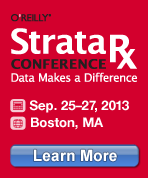Last month, Strata Rx Program Chair Colin Hill, of GNS Healthcare, sat down with Dr. Dennis Ausiello, Jackson Professor of Clinical Medicine at the Harvard Medical School, Co-Director at CATCH, Pfizer Board of Directors Member, and Former Chief of Medicine at the Massachusetts General Hospital (MGH), for a fireside chat at a private reception hosted by GNS. Their insightful conversation covered a range of topics that all touched on or intersected with the need to create smaller and more precise cohorts, as well as the need to focus on phenotypic data as much as we do on genotypic data.
The full video appears below.
Highlights from the conversation include:
- “How do we assess the human condition? What can we do about it?” Denny observes that while many physicians were trained to believe in the potential of science and technology, genomics alone is insufficient to help us understand these two aspects of our health. [Discussed at the 00:26 mark]
- Doing better with existing knowledge, while creating new knowledge. Denny argues that because medicine has historically focused on an episodic, symptomatic approach, we just don’t collect enough information — even in chronic patients — to understand what’s going on. [Discussed at the 01:51 mark]
- Stratifying the denominator. Denny points out that we currently define many polygenic complex diseases as homogenous, even though we know that they are multi-factorial. He stresses the need to focus on the phenotypic expression of the pathways that are involved, so that we can be more successful at targeting them. [Discussed at the 04:00 mark]
- Founding CATCH. All of these realizations, Denny says, are why he decided to step down from his previous position and found the Center for Assessment, Technology and Continuous Health (CATCH), along with colleagues at MGH and MIT. [Discussed at the 05:14 mark]
- How we’re going to interrogate, and the nature of that interrogation. Denny lists three premises: 1) Medicine has to become about presymptomatic, continuous care. 2) We need to read phenotype with the same degree of vigor that we do the genetic component. 3) We need to do a better job of telling patients what we don’t know yet and how they can help. [Discussed at the 05:57 mark]
- “We have to unify wellness with the spirit of inquiry.” Academics and patients alike tend to think of clinical care and research as two separate things. Denny argues that we need to join them, explaining to patients how the data they contribute will inform not only their own care but also our larger understanding. [Discussed at the 08:35 mark]
- “People want to think about their health, but not every 10 seconds.” Denny stresses the need for care to be both minimally invasive and minimally intrusive. He also stresses the need for data that is not static but continuous and includes behavioral and environmental measurements, among others. [Discussed at the 09:34 mark]
- Pathway-inspired measurements. Using Type II diabetes as an example, Denny underlines once again the critical role of phenotypic data and the need for a “deep dive” into the pathways at work. [Discussed at the 12:05 mark]
- Beginning to parse diabetes into different groups. Denny shares the overview of an experiment his team is running, looking at 5000 measurements over a three-week period for 500 Type-II diabetics and stratifying them to clinical criteria in the hopes of creating more useful, less homogeneous cohorts. [Discussed at the 14:25 mark]
- Assessing the immune system on a day-to-day basis. Denny says that our capacity for assessment is limited by our current incapacity for continuous monitoring and measurement. New assessment technologies to study quiescence and flares of the immune system and their relationship to chronic disease is one focus of his team. [Discussed at the 16:33 mark]
- Human target validation. Thirty percent of phase 3 clinical trials fail in the US, Denny says, and most of them fail because of lack of efficacy. This may have more to do with the complexity of the human conditions involved than the validity of the initial targets. Stratification will allow us to improve upon existing targets and tell us when to use the ones we have or in what diseases. [Discussed at the 18:55 mark]
- Passive analytics aligned with active assessment. So, how can we investigate the pathways of disease? Denny recommends a combination of passive analytics with active interrogation (such as surveys or even text messages). [Discussed at the 20:56 mark]
- “We have to align ourselves with the patient as a partner.” Denny points to the proliferation of online apps to help us manage our health and wellness, and observes that none of them are integrated into the healthcare delivery system yet. [Discussed at the 22:55 mark]
- “You cannot get a common standard of participation.” Why would all this matter to the Average Joe? Denny says that early adopters and voluntary self-measurers can provide a perspective on the larger population. We’ve already accepted that we’re not going to be able to genotype everyone, he says, and the same goes for phenotypes. [Discussed at the 24:38 mark]

Strata Rx Heath Data Conference — Strata Rx brings together the diverse communities driving innovations in big data analytics for health care. Learn about the transformation of health care through big data and how to position your company to benefit from these trends. Learn more.
